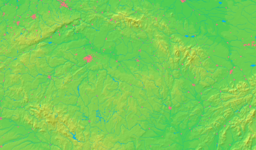Vltava
| Vltava | |
| Černý potok, Teplá Vltava | |
| River | |
|
The Vltava's bend in Prague
|
|
| Country | |
|---|---|
| Regions | South Bohemia, Central Bohemia |
| Tributaries | |
| - left | Otava River, Berounka |
| - right | Lužnice, Sázava River |
| Cities | Český Krumlov, České Budějovice, Prague |
| Source | Černý potok |
| - location | Černá hora, Šumava |
| - elevation | 1,172 m (3,845 ft) |
| - coordinates | |
| Mouth | Elbe |
| - location | Mělník |
| - elevation | 155 m (509 ft) |
| - coordinates | |
| Length | 430 km (267 mi) |
| Basin | 28,090 km² (10,846 sq mi) |
| Discharge | |
| - average | 149.9 m3/s (5,294 cu ft/s) |
 _-_location_and_watershed.svg.png) The course and drainage basin of the Vltava from its source to its confluence with the Elbe (magenta)
|
|
| Wikimedia Commons: Vltava | |
The Vltava (listen; German: Moldau) is the longest river in the Czech Republic, running north from its source in Šumava through Český Krumlov, České Budějovice, and Prague (Praha), merging with the Elbe (Labe) at Mělník. It is 430 km long and drains about 28,090 km2; at their confluence the Vltava actually has more water than the Elbe, but joins the Elbe at a right angle to its flow so that it appears a mere tributary. The river is crossed by 18 bridges and runs through Prague over 31 km[1]. Several dams were built on it in the 1950s, the biggest being Lipno Dam in Šumava.
In August 2002 a flood of the Vltava killed several people and caused massive damage and disruption along its length.
The best-known of the classical Czech composer Bedřich Smetana's set of six symphonic poems Má vlast ("My Fatherland") is called Vltava (or The Moldau), and is a musical depiction of the river's course through Bohemia.
Contents |
Physical description
The height difference from source to mouth is 1016 m and the largest stream at the source is named Černý Potok (Black Brook).
Etymology
Both the Czech name Vltava and the German name Moldau are believed to originate from the old Germanic words *wilt ahwa ("wild water") (cf. Latin aqua).
Honors
A minor planet 2123 Vltava discovered in 1973 by Soviet astronomer Nikolai Stepanovich Chernykh is named after the river.[2]
References
- ↑ Source : Avantgarde Prague
- ↑ Schmadel, Lutz D. (2003). Dictionary of Minor Planet Names (5th ed.). New York: Springer Verlag. p. 172. ISBN 3540002383. http://books.google.com/books?q=2123+Vltava+1973. Retrieved 2009-10-09.
| This South Bohemian Region location article is a stub. You can help Wikipedia by expanding it. |
| This Central Bohemian Region location article is a stub. You can help Wikipedia by expanding it. |